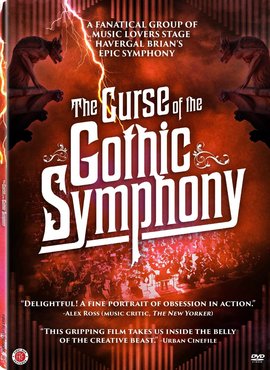
The
Curse of the Gothic Symphony (2011/First
Run DVD)
Picture:
B Sound: B+ Extras: C Main Program: B-
What
makes First Run Features such an excellent distribution company is
its willingness to release films - documentaries especially - that
touch on issues or corners of society and culture that other, larger
distributors would otherwise ignore. This is especially true when it
comes to the arts and a film like The
Curse of the Gothic Symphony.
As
a chronicle of a long-delayed Australian production of British
composer Havergal Brian's Symphony No. 1 in D minor, or the Gothic
Symphony,
Curse,
which was originally released in 2011, is a fairly niche product.
Besides being focused on classical music (which will in itself send
far too many people running in the opposite direction), the subjects
are all local musicians (in Brisbane, not even Sydney) trying to
wrangle the work of a minor 20th century composer. But the
documentary has a decent hook: the Gothic
Symphony
is thought to be cursed.
Of
course, it's a self-fulfilling prophecy. Brian's composition, broken
up into two parts, is notoriously unwieldy, calling for a chorus of
hundreds and the equivalent of two orchestras performing for more
than two hours. (It's in the Guinness
Book of Records
as the longest symphony ever composed.) The symphony was written
between 1919 and 1927 and has only been performed seven times,
beginning with its premiere in 1961. Numerous other attempts at
mounting it have failed, fueling the eternal flame of its infernal
reputation.
In
reality, the curse is just showbiz legend, like ghosts that haunt
darkened theaters, and it provides convenient cover for failing to
bring all the required pieces together and convincing people to
invest tens of thousands of dollars in a staging of a symphonic Rube
Goldberg device created by an esoteric composer. And that's the
story of most of Curse.
Led by Gary Thorpe, a Brian true believer who spent 28 years on an
Ahab-like quest to set up a performance of the Gothic,
the artists trying to get the performance off the ground in Brisbane
meet road block after road block. Curse
begins in 2005 and follows the team over a period of five years
before finally pulling off the impossible in 2010.
It's
a minor triumph culturally, but a major one for the very dedicated
people who devoted so much time and energy to lifting the curse of
the Gothic
- or
at least keeping it at bay for a night. (The fact that they had to
compromise on how large the brass section was in order to fit into
the space they booked hardly reduces their accomplishment.) And
while we revel in their triumph, albeit briefly, we never get so tied
up in the struggle to feel a sense of joyous relief at the
performance. Director Randall Wood never elevates the action to a
point where it feels like Thorpe and his team are on a heroic
cultural quest. Instead, we get an inside look at the mundanity of
fighting for funding and space and wrangling musicians, which in
itself has value. But when it comes to the obsession driving these
people to create art, or help bring art to life, we're never able to
connect with it beyond a superficial level.
Curse
comes off as fairly pedestrian because of this low-stakes directing,
but that's not necessarily an indictment. The film documents a
cultural moment that would otherwise pass unnoticed (both inside and
outside Australia) and it's wonderful Thorpe's quest has been
preserved – if only to give hope to other musicians and artists who
feel driven to exorcise the Gothic
of its cursed reputation.
On
the technical side, Curse
has the feel of a well shot home movie – that is, it comes off like
something shot on consumer-grade digital cameras. Put another way,
it looks as good as you'd expect from a low-budget film about
classical music. Audio-wise, the film doesn't require a lot from its
mix. That said, it sounds very good, especially during the climactic
performance. In terms of extras, there's not much here, just a photo
gallery and a biography of Brian. A copy of the full performance of
the Gothic
would have been nice - if only just the audio - but there were
certainly rights issues that made that impossible.
-
Dante A. Ciampaglia